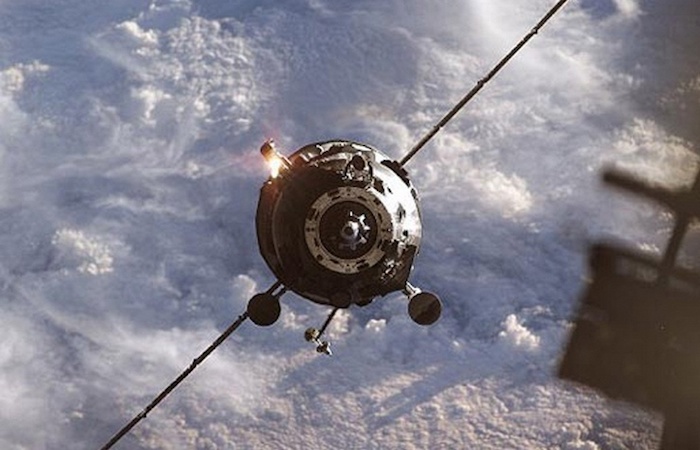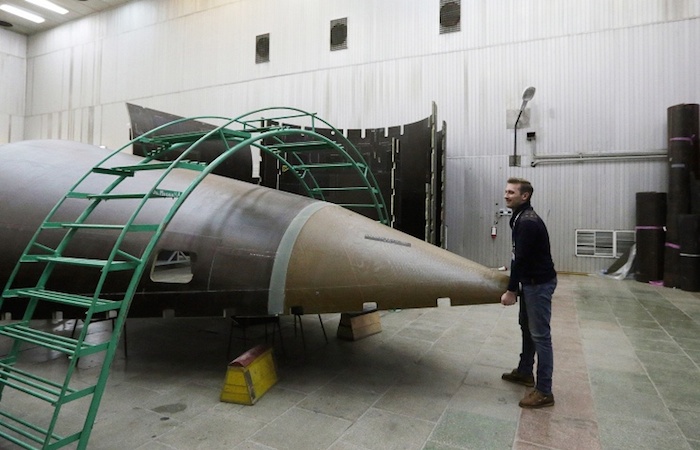.
15.05.2015

13.05.2015
Preliminary cause of Progress breakdown loss of pressure in fuel, oxidizer tanks - Roscosmos chief
MOSCOW. The cause of the failed launch of the Progress M-27M ship was a loss of pressure in the engines of the launch vehicle's third stage, Federal Space Agency (Roscosmos) chief Igor Komarov said.
"As a result of the work by the State Commission, telemetric data has been gathered which confirmed the out-of-control release that included two subsequent releases due to a loss of pressure, i.e. an opening first of an oxidizer tank and then the rocket third stage's fuel tank after the rocket's third stage propulsion units were switched off," Komarov said at a briefing commenting on the results of the state commission which probed the situation around the Progress M-27M transport cargo spacecraft.
Quelle: Interfax
----
The crew of the International Space Station (ISS) will have to stay in orbit for one more month, the Russian Federal Space Agency (Roscosmos) said on Tuesday.
"We plan make this landing in early June by the decision of the state commission," Vladimir Solovyov, the flight director of the ISS Russian segment, told a news conference.
He said a Progress cargo spaceship would be launched after the landing of the ISS crew and only after that another manned mission would be put in orbit.
It was planned earlier that three members of the ISS crew would return to the Earth on May 14.
The next docking with the International Space Station will be performed in July, Solovyov said. In his words, a cargo spaceship launch would be followed by a manned spacecraft due to safety consideration.
"Under our laws, we cannot make a manned launch next, so we suggested, and Roscosmos supported us, that it would be expedient to launch a Progress cargo ship. A different carrier rocket with a different third stage will be used," he said.
"Preliminarily, we plan to launch a Soyuz with another expedition in late July," Solovyov noted. "We will try to continue the programme, to keep a year’s flight and everything linked with it."
Initially, it was planned to launch another Progress M-28M cargo spaceship on August 6 and a Soyuz - on May 26.
On May 8, a source in the rocket and space industry source told TASS that Roscosmos planned to adjust the program of flights to the International Space Station due to the recent accident involving the Progress M-27M spacecraft. "It is suggested that the return from orbit of the expedition which is currently there be postponed from May 14 to June, then, in late June - early July, a Progress cargo spacecraft be blasted off to the ISS, and then, in the last ten days of July, a manned Soyuz launch be made," the source said, adding the proposal had forwarded by a Roscosmos working group but had not yet been approved.
The Progress M-27M cargo spacecraft was launched on April 28 from the Baikonur space center on a Soyuz carrier rocket. The rocket took the spacecraft to a higher orbit than required to dock with the International Space Station. After a few unsuccessful attempts to get control of the spacecraft, experts gave up the idea. The Progress was to take food, oxygen and other cargos to the ISS crew.
Quelle: TASS
...
Space agency probe lacks data to say what caused loss of Russian cargo vehicle
The probe, originally scheduled to be over May 14, has been prolonged till May 22 and may continue after that
The Russian space agency’s panel of inquiry probing into the loss of the Progress M-27M cargo vehicle late last month lacks data to say exactly what caused the emergency, a senior source in the space rocket industry familiar with investigation has told TASS.
"The telemetry data are not enough to name the cause of the incident with certainty. The commission’s members have been dispatched to various manufacturers involved in order to scrutinize space rocket technologies from the same batch and to simulate the emergency. This is essential, as there still is no clarity regarding the real cause of the mishap," the source said.

According to the official the probe, originally scheduled to be over May 14, has been prolonged till May 22 and may continue after that.
"True, some findings may be presented by May 22. In the meantime specialists will keep working at individual enterprises after that date," the source said.
A member of the Tsiolkovsky Russian Cosmonautics Academy, editor-in-chief of the Novosti Kosmonavtiki (Cosmonautics News), Igor Marinin, has told TASS that the real cause of the incident may never be established.
"When such accidents occur, the real cause can be accurately established very rarely. As a rule, all conclusions are probabilistic to a large extent. For instance, there is a 90% certainty that this or that factor was to blame, but there still remains a 10%-chance the cause was different. The probability only one cause will be identified is very low. Such cases are very rare," the expert said.
Another specialist, associate member of the Tsiolkovsky Cosmonautics Academy, Andrei Ionin disagrees. "I believe that the telemetry data available are quite enough. Inquiries at sub-contractor enterprises are the normal second phase of any technical probe, when specialists have clearer suspicions of what happened. Now they will be inspecting the manufacturers," he told TASS.
The Soyuz-2.1a rocket carrying a Progress cargo vehicle blasted off from the Baikonur space site in Kazakhstan on April 28. It soon turned out that the cargo craft had entered a wrong orbit and communication with it was lost. On May 8 the abortive delivery vehicle burned up in the atmosphere. Roscosmos said the accident was due to decompression of the rocket’s propellant and oxidizer tanks, which upset the normal separation of the third stage and the vehicle. Inquiries are now focused on factors that might have been behind decompression.
Quelle: TASS
.
Update: 30.05.2015
.
Ursache für Proton-M" Trägerrakete-Crash gefunden
Roscosmos blames an old-time design flaw of the Proton rocket crash
.
According to Russian space agency, the third stage engine’s pump failed exactly as it did decades ago to cause a Proton crash back in 1988
.

Russia’s space agency Roscosmos says it has found out why a Proton-M rocket, launched on May 16, failed to put in space Mexico’s communication Satellite MexSat-1. According to the probe’s findings the shaft in the third stage engine’s pump failed, just as it did decades ago to cause a Proton crash back in 1988.
Eliminating the flaw will not require great costs, Roscosmos said. However, the agency’s chief Igor Komarov promised to take disciplinary and administrative measures following the inquiry and to present a plan for reforming the system of quality management in the space rocket industry.
JUST AS IT HAPPENED IN 1988
"The abortive launch of the Proton-M rocket was due to the failure of the third stage’s engine, caused by excessive vibration," Komarov told the media.
he first deputy chief of Roscosmos, Aleksandr Ivanov, explained the cause was rooted in the design, and not workmanship. A series of experiments identified with certainty there had been problems with the rotor of the turbo pump, specifically, with its shaft. The general designer of Proton’s manufacturer - the KIhrunichev Centre - Aleksandr Medvedev said that the flaw had caused a similar accident back in 1988. Both crashes looked very much alike.
"As we understand, the unit had been ‘unwell’ for quite a while, since 1988," Medvedev said.
In the meantime, just three days after the crash Russia’s Deputy Prime Minister Dmitry Rogozin, who oversees the space rocket industry, made a similar statement in the State Duma. He told the lawmakers Proton’s loss was due to an old-time design flaw.
THE ROCKET TO BE IMPROVED
"In the near future the shafts will be replaced in all turbo pumps," Roscosmos first deputy chief Aleksandr Ivanov told the media, adding he was certain that the proposed measures would "cure the disease."
"We will be replacing the most vulnerable components," the Khrunichev Centre’s chief designer said. "Both elements of the turbo pump and the mounting structure are to be improved and replaced." Komarov promised that correcting the designers’ mistake would not push up Proton rockets’ manufacturing costs.
"The money question is not a very big one, because it will be enough to alter the shaft’s design and material," he explained. "The material has been identified and some fundamental work carried out already."
Roscosmos has refrained from disclosing the date of Proton’s next launch so far. "The date of Proton-M’s next launch is to be announced in June 2015," Komarov said.
MEASURES WILL BE TAKEN
Komarov promised to take "disciplinary and administrative measures" in connection with Proton’s loss but avoided disclosing any details. "When the decisions are made, you will know them," he told the media.
At the same time he disclosed a plan for eliminating errors in quality management at the space rocket industry. The plan is likely to be systemic.
"The inquiry identified quality management and manufacturing process inconsistencies. They are very clear. Instructions have been issued. A plan for eliminating the mistakes will be finalized within two weeks. Possibly, it will be systemic," Komarov said.
REASONS BEHIND THE LOSS OF PROGRESS CARGO CRAFT
Shortly before Proton’s loss the space industry saw another emergency. A Soyuz-2.1a rocket that blasted off from the Baikonur space site in Kazakhstan failed to put in orbit the ProgressM-27M cargo spacecraft that was carrying supplies to the International Space Station. Roscosmos has already announced its preliminary findings - the incident was due to improper separation of the rocket’s third stage and the space vehicle following decompression of the rocket’s fuel tanks.
The exact causes have not been announced yet. According to Roscosmos First Deputy Chief Aleksandr Ivanov, the working group will be through with the probe soon. "In the near future," he said, when asked by TASS when the investigation of the failed launch of the Progress cargo spacecraft might be completed.
Quelle: TASS
5081 Views
